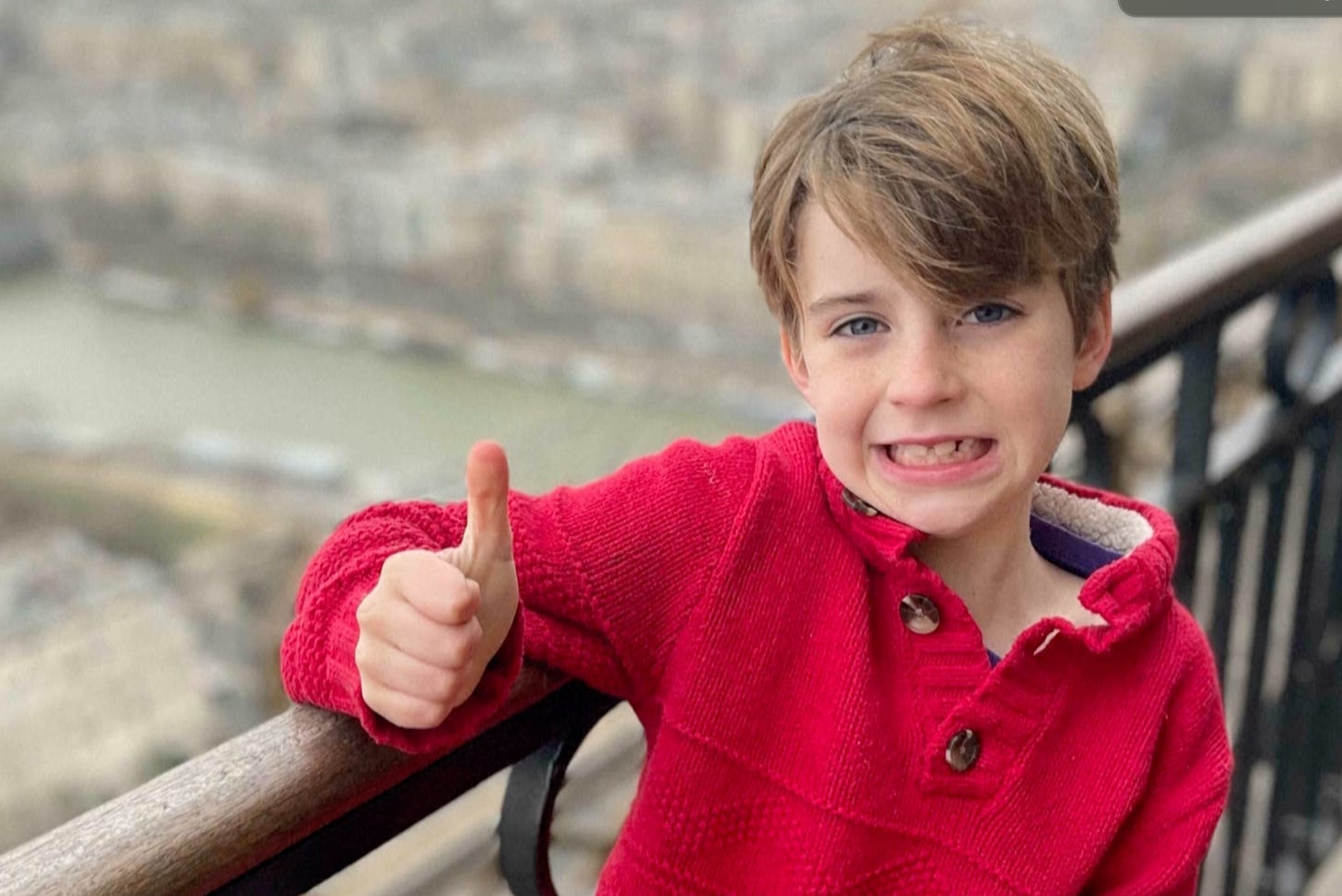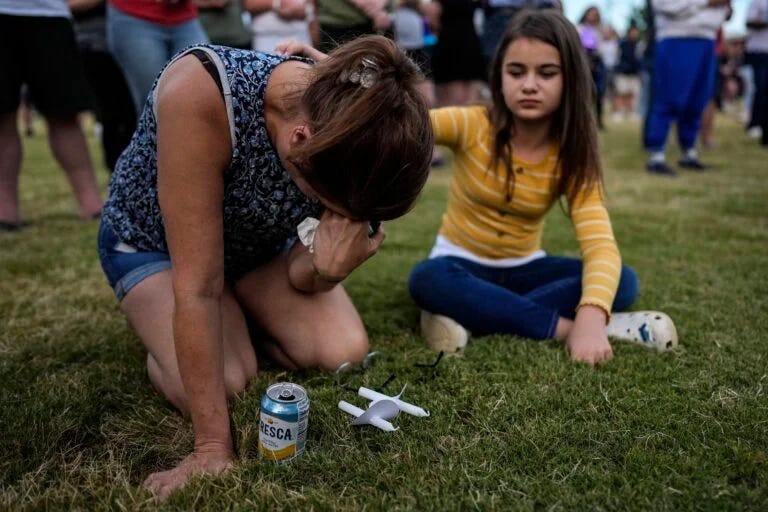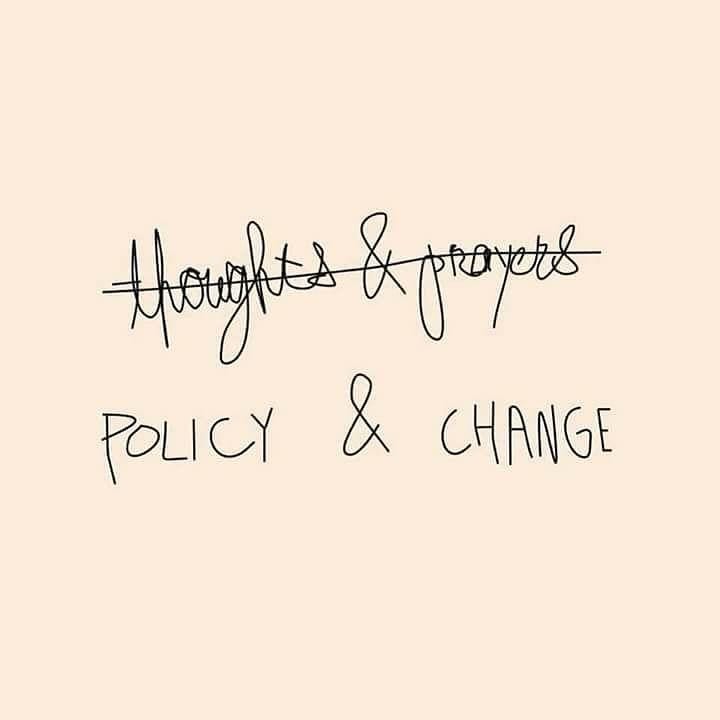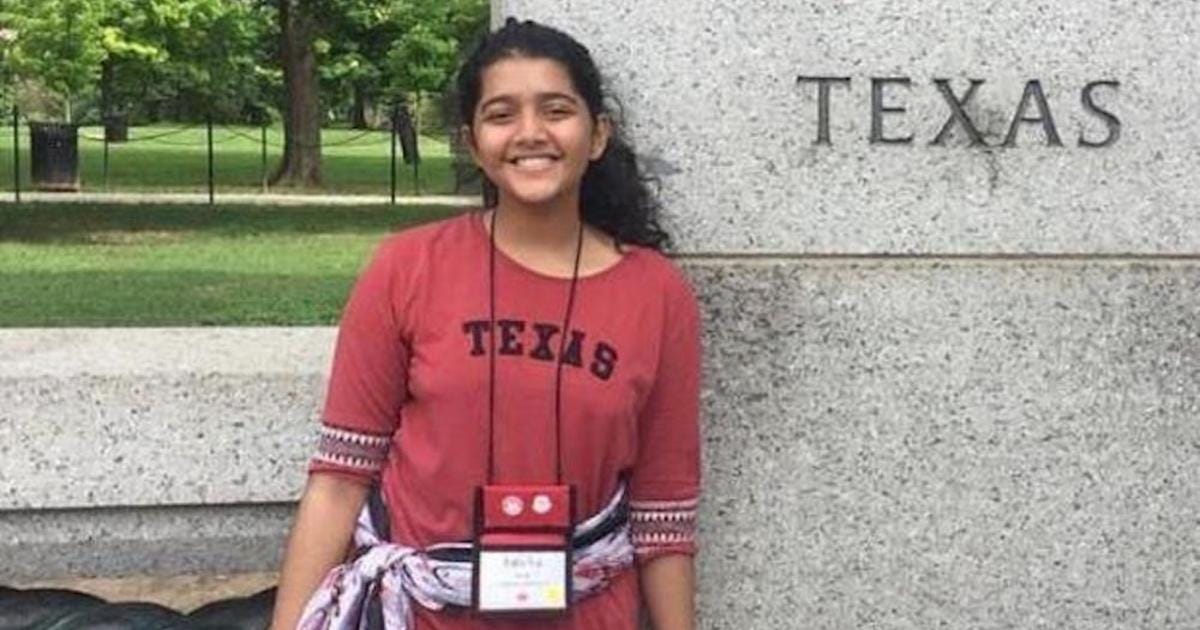
I was in the midst of writing a post for the new school year, when my post on school shootings from last year became sadly relevant again. Here is a repost for new readers who missed it the first time and longtime subscribers to reread.
On Wednesday, September 4, 2024, a fourteen-year-old student opened fire with an AR-15-style automatic rifle in his high school in Winder, Georgia, killing two students and two teachers and injuring nine other people.

As with other school shootings, we heard many voices offering their “thoughts and prayers” for the victims and their families. We also heard many voices expressing frustration, even anger, at the very words “thoughts and prayers,” especially when those words came out of the mouths of politicians.
“Policy and change! Not thoughts and prayers,” has been an increasingly common cry of protest. I saw it on memes posted by friends on social media in 2024.1 I also saw the same slogan written on a poster-board sign at a March for Our Lives protest I attended in February of 2018.
That was the month that another teen-aged shooter, also armed with an AR-15 style rifle, killed seventeen people and injured seventeen others at Marjory Stoneman Douglas High School in Parkland, Florida. It was the deadliest mass shooting at a high school in US history.
There was another high school shooting in 2018, however, that I remember even more vividly, though it was only the eighth most deadly in the US. On May 18, in Santa Fe, Texas, a seventeen-year-old student, this time with a sawed-off shotgun, killed eight students and two teachers.
I remember this shooting because one of the victims, Sabika Sheikh, was a foreign exchange student from Pakistan. Our family was an AFS family. My wife and I were AFS parents. We had, the two previous summers, said goodbye to two exchange students who lived in our home, the first from China and the second from Germany. Also, at that very moment in May of 2018, our own flesh and blood daughter was herself an exchange student living in China.
The photograph of Sabika Sheikh, which circulated in the news media, showed her posing in front of a park monument, proudly wearing her Texas t-shirt, smiling, about to finish her amazing year in the United States. Her host family, who, if they were anything like us as a host family, loved her like their own daughter. Her flesh and blood family back in Pakistan, if they were anything like us as parents of an exchange student, happily anticipated having her home with them in just a few more days.
I particularly remember this shooting for another reason. It happened on a Friday, and I was preaching that Sunday. My regular job as a religion professor in a college is very different from being a preacher in church, but I occasionally supply a pulpit for a congregation that is missing their regular preacher. That Sunday was at Belpre Congregational Church in Ohio, across the river from Parkersburg, West Virginia.
It happened to be Pentecost Sunday, when churches celebrate the miracle of the Holy Spirit. The lectionary texts included the familiar story of the Pentecost from the book of Acts, in which the Spirit descends on the apostles. Also included was a passage from the apostle Paul’s letter to the Romans. In it, Paul explains how the Spirit of God helps those who find themselves unable to pray.
Context and text worked together to give me a topic. I tossed out the other ideas I had been working on that week and put together a sermon on the tragedy of school shootings, the empty repetition of “thoughts and prayers,” and the false dichotomy of “Policy and change! Not thoughts and prayers.”
Why isn’t the slogan “Thoughts, prayers, and policy change?”
Because it seemed to me, as I explained to the congregation in Belpre that Sunday morning, that one of the victims of these shootings, one of the innocent bystanders, so to speak, is prayer. Not that prayer itself can be harmed, because its power comes ultimately from God. But our understanding of prayer can be harmed. Our capacity to even try to pray can be harmed.
Our ability to pray suffers when society misuses the term “prayer,” and when these cultural definitions get into our heads: when, rightly or wrongly, prayer is perceived as a defense against feeling the pain of others; when prayer is a substitute for action; when “you have my thoughts and prayers” begins to sound pretty much like “I don’t care,” or “I care, but I can’t—or won’t—change anything.”
But prayer that numbs, that paralyzes, that leaves the world unchanged is not real prayer. Real prayer expands compassion. Real prayer inspires action. Real prayer changes things.
When we don’t know how to pray, the apostle Paul explains, the Spirit intercedes for us, giving us a new language—more than a new language, a new voice—to pray in. The Spirit speaks through us with “groanings too deep for words.” By “groaning,” Paul really meant groaning—out loud. Groaning like a woman in labor. “Groaning together” with all of creation, feeling the agony of all beings, subjected to the “futility” of sin and suffering (Romans 8:18–27).
The agonizing “futility” Paul talked about is never more evident than in a school shooting. It is not only the loss of young lives, so full of potential. It is the unending trauma inflicted on the surviving victims and witnesses. It is the grief of their friends and family. It is the soul-destroying power that violence has over its perpetrators, including the soul of a young man who, in his worst moment, had the firepower to act out his worst fantasies.
Most of all, it’s that it happens so often! It’s that the first and eighth most deadly high school shootings happened in the same year. It’s that there’s even a top ten at all. It’s that a girl would have been safer going to school in her home country of Pakistan, where Malala Yousafzai was shot by the Taliban for going to school, than in the United States.
And the absurdity continues.2 As I write today in 2024, there have been at least 417 school shootings in the United States since 1999. Fifty of these have occurred this year. During the few days it took me to decide to write about the September 4 shooting in Georgia, another student was killed in a shooting at Joppatowne High School in Maryland. During the time it has taken me to actually complete this Substack post, there have been who knows how many other acts of and attempts at gun violence inside and outside of schools, including a second assassination attempt on a presidential candidate in two months.
Such futility can be overwhelming, and it is tempting to run away from it, to escape into a private “spiritual” otherworldliness. We might even label this escapism “prayer.” But prayer, as Paul explains, is not an escape from the world’s suffering. Prayer is discovering the miracle of Christ’s infinite compassion within one’s self. Prayer is embracing the world’s suffering, as Jesus did.
Prayer is not the morbid glorification of suffering for its own sake. Going back to the metaphor of a mother groaning in childbirth, Paul said that the suffering of the world in the present is the prelude to a new life. Paul called on believers, guided by the Holy Spirit, to participate in God’s new perfected creation, prefigured in Christ’s resurrection.
To be sure, the future that Paul hoped for was not simply a matter of social progress, but it included social progress. Salvation is not only something that happens after we die. It is also a matter of improving the world around us while we are living. To think otherwise is, as Martin Luther King put it, a “strange, un-biblical distinction.” It is totally at odds with the prophetic message of the Old Testament, that the highest form of worship is to do justice, love kindness, and walk humbly with our God. It is totally at odds with the prophetic message of the New Testament, in which Jesus teaches us to pray for God’s kingdom to come on earth as it is in heaven.
Believers are called to work, humbly and diligently, taking risks, listening to ideas from all quarters, doing what we can, this side of heaven, to lay the foundations for God’s kingdom of justice and peace. Believers are called to make the world better for those who suffer the most. And this is where prayer fits in. Prayer is not a substitute for action. Prayer is finding the compassion, hope, and strength to work for a world where the futility of senseless violence is at last overcome.
That is what I told the Belpre congregation six years ago. That is what I still say. It is what I still believe. But as long as we are on the subject of prayer, and the question of whether prayer really helps, I will add one more thing. We already have our two boats and a helicopter!
This is a reference to a very old joke, so old that I won’t repeat it. But if you don’t know it, you can watch the great actor Karl Malden tell it (in his last screen role, as Father Thomas Cavanaugh in an episode of the television series West Wing). The point of this joke/parable is that answers to prayers can come in the form of ordinary things that are right in front of us if we choose to see them, such as common-sense gun laws.
In this linked essay, journalist Nicholas Kristof lists several reforms that could save thousands of lives. They include age restrictions, background checks, and red flag laws: measures that come nowhere near treading on the Second Amendment. In fact, these laws and regulations have already been enacted in gun-friendly states. It’s just a matter of getting all those states to enact all the measures.
If you don’t like Kristof’s solutions, look for others. You will find many other sources of wisdom on the matter. Also, you can vote for the leaders who are at least willing to recognize the problem and give some of these solutions a try, rather than throwing up their hands and saying nothing can be done. There are plenty of boats and helicopters around.
Thank you for reading this post, especially those of you who expected the usual lighthearted reflection on teaching. I didn’t even tell a whole joke! Instead I slipped in a covert sermon. But now that it’s done, I will leave you with a benediction:
May the One who suffered with us in his violent death, the same One who overcame violence and death for all of us in his resurrection, be with you now and always, and give you compassion, hope, and the power to change things.
And don’t forget to vote.
And again in August of 2025!
Including the absurdity of this post again being relevant less than a year later with the shooting of school children at a Catholic church in Minneapolis.



